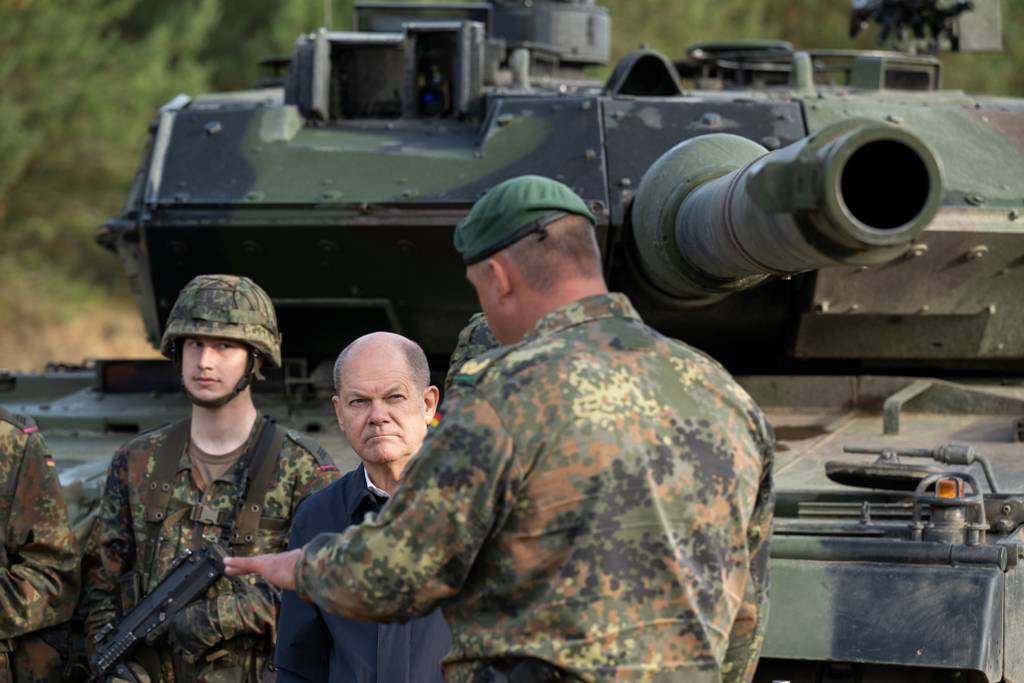
GRAZ, Austria – Germany’s government authorized more arms exports in 2023 than ever before, according to preliminary figures disclosed to lawmakers last month.
The war in Ukraine partly fueled this uptick, with exports to Kyiv more than doubling compared to 2022. The record-breaking volume follows the government’s commitment to placing tougher restrictions on arms sales, a promise from the campaign trail.
As of mid-December, Germany had authorized the export of €11.7 billion ($12.8 billion) in defense articles, as revealed in a response to a parliamentary inquiry. Of this amount, €6.1 billion were weapons, with the remaining €5.6 billion classified as “other defense articles.”
The previous record for arms exports was set in 2021, at €9.35 billion.
An official tally for all of 2023 is expected from the Berlin government in the coming weeks.
The largest chunk of exports last year was destined for Ukraine. Kyiv was authorized to receive over €4.1 billion in military exports from Germany in 2023, the preliminary numbers show. It marked a further increase in aid for Ukraine from €2.24 billion worth in authorized exports in 2022.
Israel, too, was among the top ten intended recipients, with €323 million earmarked for the country that has been at war with Hamas since Oct. 7. This marked a tenfold increase over 2022, German public broadcaster ARD reported.
These export authorizations to governments engaged in hostilities further called into question Germany’s self-imposed restriction of not exporting arms to active war zones, a norm that was already qualified in Chancellor Olaf Scholz’s pivotal “turning point” (“Zeitenwende”) speech following Russia’s invasion of Ukraine in 2022.
Scholz’s Social Democrats had made it one of their campaign promises to enact a new law restricting arms exports to governments engaged in war or with problematic human rights records. The governing coalition of Social Democrats, Greens and Liberals enshrined the promise as a separate point in their coalition treaty in November 2021 and published a ten-page proposal containing the key points. The text straddled calls for stricter benchmarks on the one hand and the need for geopolitical maneuvering on the other. Since then, the initiative appears to have largely stalled, overshadowed by a fundamental reassessment of Germany’s security situation in the aftermath of Russia’s war against Ukraine.
Aside from Ukraine, the top intended recipients in 2023 were Norway (€1.2 billion), Hungary (€1 billion), the UK (€655 million) and the U.S. (€545 million). Poland, France, Israel, South Korea and Cyprus were also among the top ten.
Linus Höller is a European correspondent for Defense News. He covers international security and military developments across the continent. Linus holds a degree in journalism, political science and international studies, and is currently pursuing a master’s in nonproliferation and terrorism studies.
- SEO Powered Content & PR Distribution. Get Amplified Today.
- PlatoData.Network Vertical Generative Ai. Empower Yourself. Access Here.
- PlatoAiStream. Web3 Intelligence. Knowledge Amplified. Access Here.
- PlatoESG. Carbon, CleanTech, Energy, Environment, Solar, Waste Management. Access Here.
- PlatoHealth. Biotech and Clinical Trials Intelligence. Access Here.
- Source: https://www.defensenews.com/global/europe/2024/01/02/german-weapons-exports-reached-record-high-in-2023/
- :has
- :is
- :not
- 1
- 11
- 2021
- 2022
- 2023
- 24
- 35%
- 7
- 70
- 8
- a
- According
- across
- active
- aftermath
- against
- Aid
- All
- already
- also
- among
- amount
- and
- appears
- arms
- articles
- AS
- At
- Austria
- authorized
- been
- before
- benchmarks
- berlin
- Billion
- by
- called
- Calls
- Campaign
- classified
- coalition
- coming
- coming weeks
- commitment
- compared
- continent
- country
- covers
- Currently
- Cyprus
- Defense
- Degree
- Democrats
- destined
- developments
- doubling
- engaged
- European
- EVER
- expected
- export
- exports
- Figures
- following
- follows
- For
- France
- from
- fueled
- fundamental
- further
- geopolitical
- German
- Germany
- governing
- Government
- Governments
- greens
- had
- hamas
- hand
- Have
- he
- High
- holds
- HTML
- HTTPS
- human
- human rights
- Hungary
- images
- in
- Increase
- Initiative
- inquiry
- intended
- International
- into
- invasion
- Israel
- IT
- journalism
- jpg
- Key
- korea
- largely
- largest
- Last
- Last Year
- Law
- lawmakers
- linus
- made
- marked
- master’s
- Military
- million
- Month
- more
- Need
- New
- news
- Norway
- November
- November 2021
- numbers
- Oct
- of
- official
- on
- ONE
- or
- Other
- over
- Parliamentary
- pivotal
- placing
- plato
- Plato Data Intelligence
- PlatoData
- Point
- points
- Poland
- political
- preliminary
- previous
- promise
- public
- published
- pursuing
- qualified
- question
- reached
- receive
- recipients
- record
- records
- remaining
- response
- restricting
- restriction
- restrictions
- Revealed
- rights
- s
- sales
- Science
- security
- separate
- set
- show
- since
- situation
- Social
- South
- South Korea
- speech
- stricter
- studies
- Tally
- ten
- Terrorism
- text
- than
- that
- The
- The Initiative
- the UK
- their
- then
- this
- to
- too
- top
- Top Ten
- trail
- u.s.
- Uk
- Ukraine
- volume
- war
- War in Ukraine
- was
- Weapons
- Weeks
- were
- with
- worth
- year
- zephyrnet
- zones












